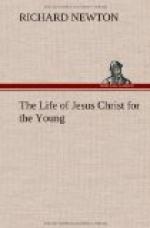The second wonder about the transfiguration is—THE WONDERFUL COMPANY—that appeared with our Saviour then.
At the close of his temptation in the wilderness, Jesus had some wonderful company too, but it was different from what he had now. Then, we are told that “angels came, and ministered unto him.” And in the garden of Gethsemane, when he was sinking to the earth, overcome by the terrible agony through which he was passing, he had more company of the same kind; for we read that—“there appeared unto him an angel from heaven strengthening him." St. Luke xxii: 43. But it was not the company of angels that waited on him at the time of his Transfiguration. No: but we read that, “there appeared unto him Moses, and Elias,” or Elijah. And if we ask why did not the angels come to him now, as they did on other occasions? Why did these distinguished persons, of the Old Testament history, come from heaven to visit him in place of the angels? It is easy enough to answer these questions. This transfiguration of Christ took place, as he himself tells us, in order to give his disciples a view of the glory that will attend him when he shall come in his kingdom. When he shall appear, on that occasion, all his people will come with him. Those who shall have died before he comes will be raised from the dead and come with him, in their glorious resurrection bodies. And those who shall be living when he comes will, as St. Paul tells us,—“be changed in a moment, in the twinkling of an eye”—I. Cor. xv: 52, 53—and have beautiful, glorified bodies, like the bodies of those who have been raised from the dead. And both these classes of Christ’s people were represented by the distinguished persons who formed the company that appeared with Jesus at the Transfiguration. Moses had been in heaven nearly fifteen hundred years when this scene took place. He had died, as other men do, and had been buried. It is supposed by many wise and good men that his body had been raised from the dead, that he might appear in it on this occasion. And thus Moses represented all the dead in Christ, who will be raised to life again at his coming. Elijah had been in heaven for almost a thousand years. He had never died, and never lain in the grave. He was translated. This means that he was taken up to heaven without dying. But St. Paul tells us that bodies of flesh and blood, like ours, cannot enter heaven. I. Cor. xv: 50. They must be changed, and made fit for that blessed place. And so, we know, that as Elijah went up to heaven, in his chariot of fire, the same wonderful change must have passed over his body which we have seen will take place with those of Christ’s people who shall be living on the earth when he comes again.




